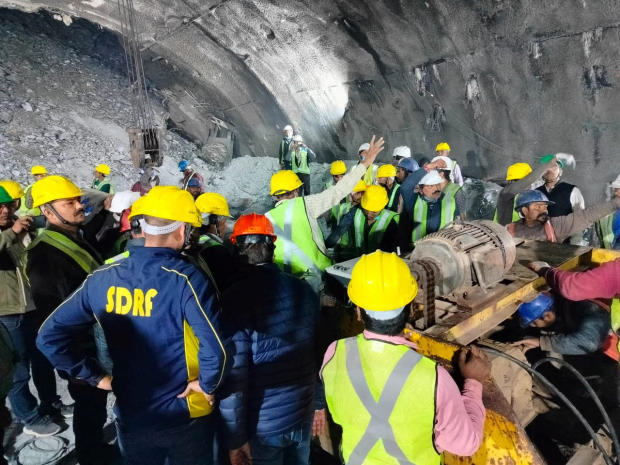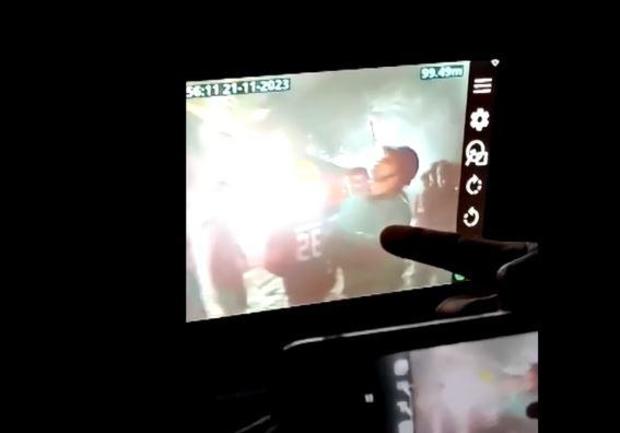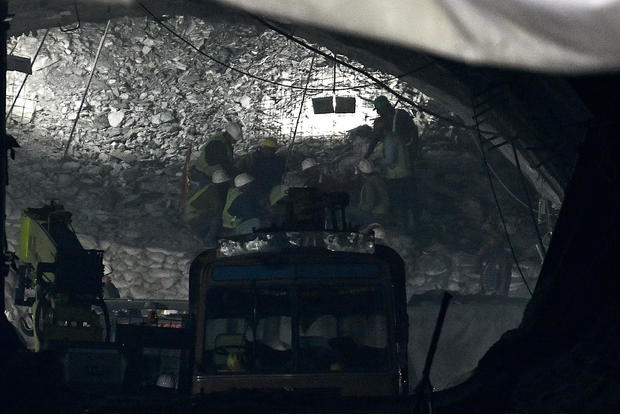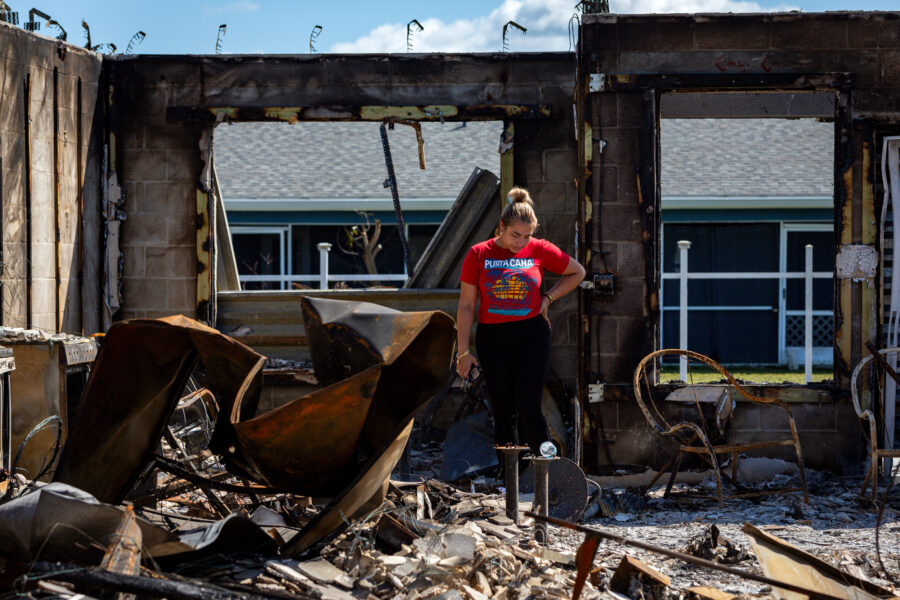10 days after India tunnel collapse, medical camera offers glimpse of 41 men trapped inside awaiting rescue
New Delhi — Forty-one construction workers trapped inside a tunnel under construction in northern India's Himalayan region were seen in a video Tuesday for the first time since a partial collapse of the tunnel 10 days earlier left them stuck behind a mountain of rubble. The video, captured by a medical endoscopic camera slipped into the tunnel through a pipe forced through the debris pile on Monday, showed the men wearing hard hats, reflective jackets and a glimmer of hope on their stubble-covered faces.
The workers were trapped in the highway tunnel in Silkyara, in northern India's Uttarakhand state, by the partial collapse early on Nov. 12 that was triggered by a suspected landslide.
A narrow pipe drilled into the tunnel on the first day of the collapse has enabled rescuers to supply the trapped workers with sufficient oxygen, food and medicine, but since then, the rescue effort has been stymied by a series of challenges.

The rescuers' initial plan, to force a pipe wide enough for the workers to crawl out of horizontally through the rubble heap, has proven unsuccessful, largely due to debris continuing to fall and fear that large-scale drilling could lead to further collapses — including in the 1.5-mile stretch where the workers are trapped.
Authorities have said the rescue could still take several more days, but getting the first glimpse of the trapped men, and a conversation they were able to have with rescuers by walkie-talkie, have raised hopes and morale for the rescuers.
"Are you alright? If all of you are okay, please show yourself before the camera. Please raise your hands and smile," rescuers told the men as the medical camera watched.
The men could be seen lining up for the camera, some of them waving.

"We will reach you very soon, please do not worry. Please come in front of the camera one by one. We want to show your relatives that you are okay," a rescuer told them through the walkie-talkie.
One of the trapped workers, Jaidev, got the rescuers to record a message for his mother, whom he told not to worry.
"I am fine. Please, you and father eat your meals on time," he told his mother.
Family members of some of the trapped workers have waited outside the tunnel for days, voicing anger and, in some cases, blaming authorities for the still-fruitless rescue efforts. But they've been able to speak with the trapped men regularly.
"I have been talking to him every day. Today also I talked via the big pipe which was inserted," said Indrajit Kumar, whose brother Biswajit Kumar is among the marooned workers. "They are all safe inside."
The rescuers used the same newly-drilled six-inch wide pipe on Monday to send the trapped men their first hot meal, packed into plastic bottles. They have also been sent Vitamin C and anti-depression medicine, to help them deal with the stress of being trapped, officials said.

Anshu Manish Khalkho, director of the National Highways and Infrastructure Development Corporation (NHIDCL) that is building the tunnel, called the pipe the "first breakthrough."
Authorities have come up with five possible plans to extract the trapped men, including drilling vertically from the top of the mountain into the tunnel. Drilling to create that vertical shaft was expected to start Tuesday evening, according to Devendra Patwal, a disaster management official overseeing the rescue.
The rescuers will need to dig down roughly 338 feet to reach the trapped workers, which could take several days. Efforts to reach the men by boring horizontally through the rubble heap were also set to resume after being halted over the weekend due a "loud cracking noise" heard during the drilling.
"This is an extremely dangerous environment… auguring requires very precise engineering," Arnold Dix, head of the International Tunnelling and Underground Space Association (AITES), who's helping oversee work at the tunnel site, said earlier this week.
Environmentalists have warned for years against major construction projects in the ecologically fragile Himalayan region. The relatively young mountain chain is prone to landslides.
The tunnel is part of a federal government infrastructure project dubbed the Char Dham highway, which is aimed at improving connectivity between four popular Hindu pilgrimage sites in northern India.
- In:
- India
- Rescue
- Himalayas
Disclaimer: The copyright of this article belongs to the original author. Reposting this article is solely for the purpose of information dissemination and does not constitute any investment advice. If there is any infringement, please contact us immediately. We will make corrections or deletions as necessary. Thank you.
Title:10 days after India tunnel collapse, medical camera offers glimpse of 41 men trapped inside awaiting rescue
Url:https://www.investsfocus.com









